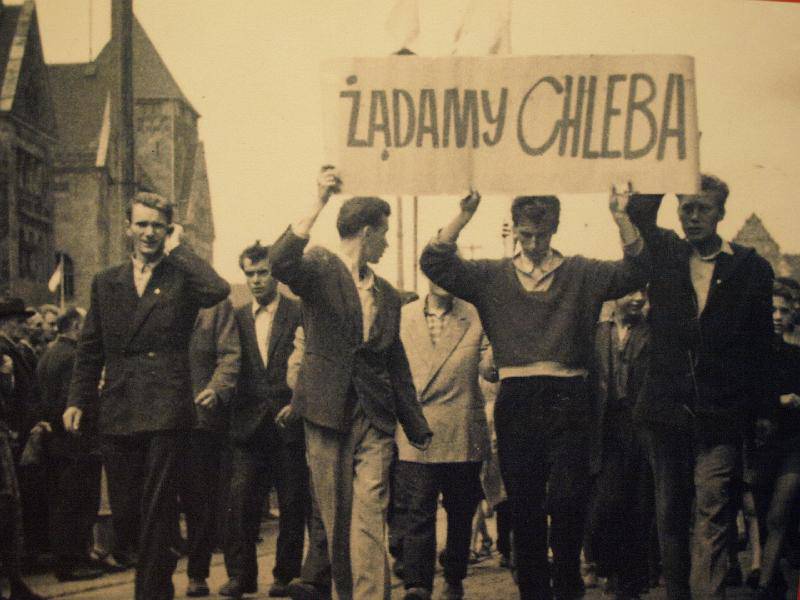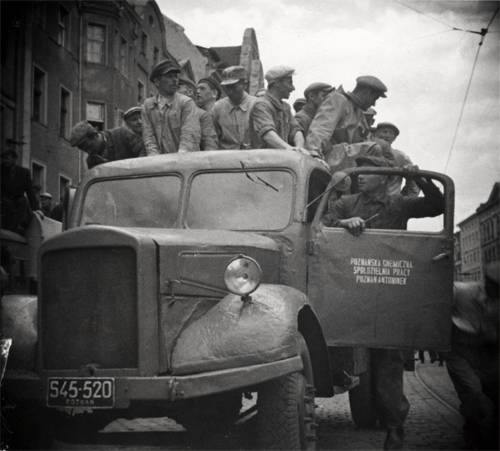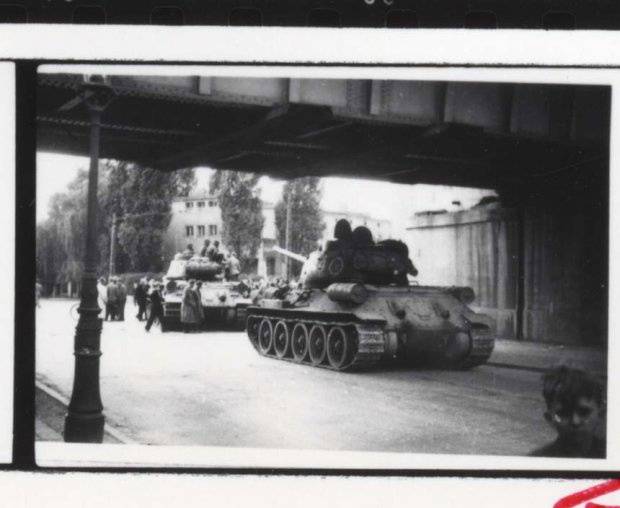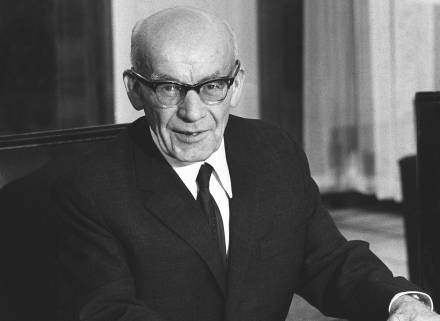Poznan June. Anti-Soviet "Maidan" in Poland 1956 of the year

Opposition sentiments among a part of the population of Eastern European countries began to grow into open discontent with government policies from 1953 onwards - after the death of Joseph Stalin. Poland, as one of the largest and most developed countries of the socialist camp, became one of those states where dissatisfaction with the existing order was very pronounced. First, the deterioration of the socio-economic situation of the population did not suit many people in the country. Labor standards in enterprises increased, but prices remained high, there was a shortage of goods, there were complaints about the quality of housing and communal services and the provision of affordable housing to residents of the country. Secondly, there was growing confidence in the need to reform the political system, which was supported by news from the Soviet Union. In the USSR, in the 1956, the XX Congress of the CPSU was held, which criticized the Stalinist policy. This caused a violent reaction not only in Soviet society, but also in the countries of the socialist camp. And if in China, Albania or Romania the criticism of Stalinism was perceived negatively, in Poland many expected to soften the political regime.
Protest attitudes in society were skillfully inflamed by opponents of the socialist path of development of Poland, Polish nationalists associated with immigrants who were in the United States, Great Britain and other Western countries. That is, the objective shortcomings of the situation in the country became a fertile ground for the actions of all sorts of anti-Soviet forces. It should also not be forgotten that the anti-Russian positions were almost always inherent in the majority of the Polish intelligentsia, and in the years of the Soviet Union, anti-Russian Polish nationalism simply assumed the form of anti-Soviet conservatism. However, in the working environment, criticism of the country's political course was usually carried out from the left - the workers insisted on greater self-government, participation in solving managerial tasks in enterprises, and improving economic and labor conditions.
If we look at the history of the Eastern European countries of the 1950s, it is obvious that in a number of socialist states in the period from 1953 to 1956. there were mass popular speeches. So, on May 3, 1953 broke out a strike by tobacco workers in Bulgaria. 31 May - 2 June 1953's. The general strike began at some industrial enterprises in Czechoslovakia. 15 - 18 June 1953's. mass unrest occurred in the German Democratic Republic, and they were able to suppress only after the intervention of the Soviet troops. Thus, Poland was not an exception from the general list of countries in Eastern Europe, where in the 1950-ies. there were mass popular speeches. Moreover, if we take into account that the Polish population had a strong political identity, many Poles were opposed to the communist government, as they were zealous Catholics.
 In June, the 1956 of the Year in Poznan hosted the International Fair, which was attended by numerous foreign delegations. In many ways, it was the presence of foreigners in the city that motivated the opposition-minded residents of the city to speak. Oppositionists expected that the authorities would not act strictly in the presence of foreign guests during the dispersal of the demonstration. The first 28 of June 1956 of the year were the workers of the machine-building plant named after Stalin (later renamed the combine named after Tsegelsky). They were supported by teams from other Poznań enterprises.
In June, the 1956 of the Year in Poznan hosted the International Fair, which was attended by numerous foreign delegations. In many ways, it was the presence of foreigners in the city that motivated the opposition-minded residents of the city to speak. Oppositionists expected that the authorities would not act strictly in the presence of foreign guests during the dispersal of the demonstration. The first 28 of June 1956 of the year were the workers of the machine-building plant named after Stalin (later renamed the combine named after Tsegelsky). They were supported by teams from other Poznań enterprises. About 100 thousands of people took to the streets of the city - an unprecedented number of demonstrators, by the standards of Poznan. They carried the slogans of "Bread!", "Freedom!", "God!", "Down with Communism!", Expressing the political position of the "core" of the protesters. The rally began outside the city administration building, then moved to the city prison and to the building of the Poznan State Security Department. In the hands of the demonstrators there were several dozen firearms. weapons. Now it is difficult to say what triggered a bloody clash on the streets of the city. There is something in common between the events in Novocherkassk in the 1962 year and the events in Poznan. At least, they developed according to a similar scenario. At first, the demonstrators behaved more or less culturally, but then aggressive manifestations began to grow in the crowd, and radical demonstrators, calling for violence, began to rule the crowd. So the events in the center of Poznan were out of control. The workers rushed to the building of the city committee of the Polish United Workers' Party and defeated it, and also stormed the city prison, setting free the prisoners in it who were arrested on political charges. At liberty, there were about 250 people.
Some demonstrators held gas bottles, stones, sticks, and even firearms in their hands, which provoked bloodshed. First, small shootings took place in the city, then parts of the Ministry of Public Security of the Polish People's Republic arrived in Poznan, which defeated the demonstrators. To neutralize the protesters, 10 000 soldiers and officers and 400 armored vehicles were required to enter Poznan. The fighting in the streets of Poznan lasted almost a day. At least 57 people died in them, 60 people were injured of varying degrees of severity. Among those killed during the dispersal of the demonstrators was a thirteen-year-old boy, Romek Stzalkovsky. Initially, the Polish leadership responded very harshly to the Poznan uprising. Prime Minister Josef Cyrankiewicz promised that everyone who dares to raise his hand against the people's government will be cut off by the people's government.
In Poznan, “sweep” of the city from protest elements began. Hundreds of Poznan residents who took part in the riots were arrested and brought under investigation, many of them then appeared before the court. The total number of those arrested was 323 people, 154 of them were brought to justice. In the end, 37 people were tried. Of these, 2 was released, 4 was given suspended sentences, 23 people received various terms of imprisonment - from two to six years. Subsequently, all of them were released, with the exception of a few people involved in the murder of a law enforcement officer.

Such a mild attitude towards the participants in the mass unrest is explained by the fact that by this time the Polish leadership had gained strength from reformists who were in favor of changing the country's political course towards a gradual distancing from close cooperation with Moscow. The reformists secretly indulged the protest movement, viewing it as one of the instruments of political pressure on the Soviet leadership in their own interests. In Polish enterprises, with virtually complete indifference of the party leadership and security agencies, councils of self-government workers were created, which, if anything, were supposed to mobilize the workers ’squads.
However, the successful suppression of speeches in Poznan has not yet meant "appeasement" of Poland. The situation in many Polish cities remained tense. In turn, the Soviet troops stationed in Poland were ready at any time to come out to suppress possible unrest, and the ships of the Soviet Navy appeared at the Polish coast. In this situation, Nikita Khrushchev arrived in Poland. The reformist lobby in the Polish leadership managed to convince the Soviet leader that the replacement of conservative Stalinists for reformists would have a fruitful effect on Poland’s internal situation and would become the most important means against working-class speeches. Khrushchev apparently agreed with this point of view and gave the go-ahead to liberalizing the political course in the country.
19-21 October 1956 was held the VIII plenum of the PUWP Central Committee. Wladyslaw Gomulka was elected head of the Polish Communist Party. In the country, Gomulka had a reputation as an opposition politician, a supporter of political and economic reforms. Although Gomulka himself was a communist, he was actively supported by many of those Poles who took to the streets of Poznan in June 1956. October 24 Gomulka addressed the inhabitants of Warsaw with the appeal - “Enough rallies! Enough demonstrations. By these words he understood that the workers had fulfilled their task - they contributed to the approval of him, Gomulka, the authorities, and now they can return to their daily duties.

But the election of Gomulka only stimulated the protest activity of the population. 18 November 1956. Skirmishes with the forces of the Ministry of Public Security in Bydgosz occurred. The demonstrators routed the ministry’s office and broke the “jammers” of the special services, which interfered with Western radio stations. 10 December 1956 unrest recurred in Szczecin, where a crowd of demonstrators attacked the prosecutor's office, the police, the city prison and the building of the Soviet consulate. Throughout Poland in the autumn of 1956, acts of vandalism were observed against monuments to soldiers of the Red Army, burning USSR flags, portraits of Soviet political and military figures, and even attempts to attack Soviet citizens - military personnel and their families. Anti-Soviet sentiments were actively inflamed by provocateurs acting among the workers of Polish enterprises and among students.
Vladislav Gomulka used unrest in Poland to strengthen his own power. He managed to achieve significant concessions and privileges for Poland from Moscow. In particular, the Soviet Union wrote off the debts of the Polish People's Republic, allowed to stop the collectivization of agriculture and improve the situation of the Catholic Church. Poland was left by a number of high-ranking civilian and military advisers from the USSR, who in the first post-war decade were actually at the head of the country's security forces. First of all, Marshal of Poland and Marshal of the Soviet Union Konstantin Rokossovsky left for Poland, in 1949-1956. who served as Minister of National Defense of Poland. In the Polish United Workers Party, Rokossovsky was considered a representative of the “Stalinist” faction, which was in opposition to the “anti-Stalinist” Vladislav Gomulka. When Rokossovsky was removed from his post as minister of defense, the Soviet leadership, headed by Nikita Khrushchev, actually supported Gomulka’s decision, and Rokossovsky left for the Soviet Union forever. General of the Army Stanislav Poplavsky returned to Moscow in December 1956, who served as Deputy Minister of National Defense of Poland and 1949, directly supervised the suppression of the Poznan uprising. Like Rokossovsky, Poplavsky was from the Red Army, who had served in the Soviet Union during the Great Patriotic War, before he was promoted to general, and then sent to 1949 to strengthen the armed forces of Poland.
Thus, the Poznan June 1956 of the year and the subsequent riots in a number of Polish cities contributed to a certain change in the internal policy of the Polish state. Gomulka, who had come to power, was implementing the concept of the “Polish road to socialism”, which provided for great relief for peasant farms and the Catholic Church. Poland acquired certain privileges and occupied a special place among the other socialist states of Eastern Europe. The unrest in Poznan influenced the events of 1956 in Hungary, where mass anti-Soviet and anti-government protests also occurred, which were only suppressed with the help of Soviet troops.
However, the Poznan uprising should not be viewed as a protest against socialism. Although the Western media tried to pass the uprising in Poznan as another evidence of the “fiasco” of socialism, in reality most of the participants in those events did not even think about restoring capitalism in Poland.
Of course, the uprising was anti-Soviet (anti-Russian) in nature and was directed against the leadership of the Polish Communist Party, but many of its members adhered to more “left-party” views, that is, they advocated socialism, but not in the Soviet model. So, the participant of the Poznan events, Karol Modzelewski, on the question of whether anyone in 1956 was in favor of Western-style capitalism, replied: “You must be joking. If someone had said something like that at the time, he would have been considered insane or a provocateur. The crowd in Poznan sang at the same time the “Internationale” and the Polish national anthem. ” Later this circumstance will be diligently silenced by both Western and Polish historians.
Information